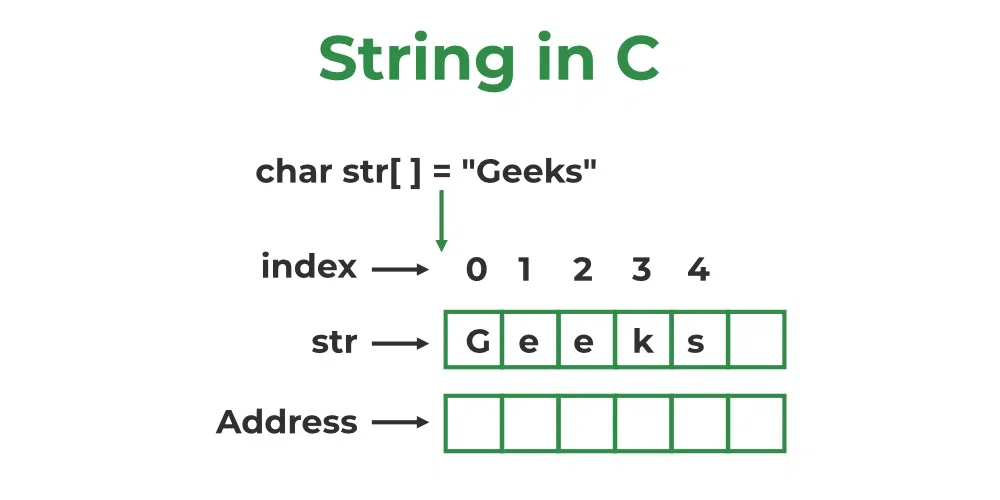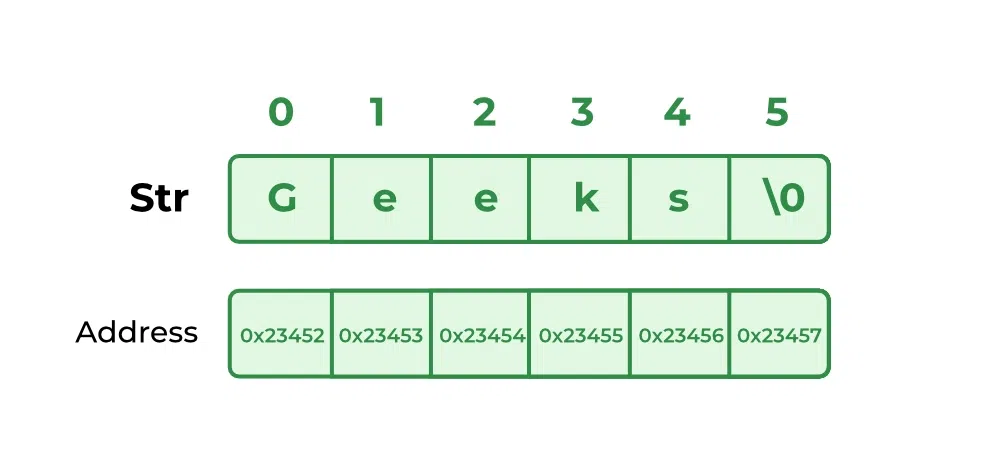A String in C programming is a sequence of characters terminated with a null character ‘\0’. The C String is stored as an array of characters. The difference between a character array and a C string is that the string in C is terminated with a unique character ‘\0’.

C String Declaration Syntax
Declaring a string in C is as simple as declaring a one-dimensional array. Below is the basic syntax for declaring a string.
char string_name[size];
In the above syntax string_name is any name given to the string variable and size is used to define the length of the string, i.e the number of characters strings will store.
There is an extra terminating character which is the Null character (‘\0’) used to indicate the termination of a string that differs strings from normal character arrays.
C String Initialization
A string in C can be initialized in different ways. We will explain this with the help of an example. Below are the examples to declare a string with the name str and initialize it with “GeeksforGeeks”.
We can initialize a C string in 4 different ways which are as follows:
1. Assigning a String Literal without Size
String literals can be assigned without size. Here, the name of the string str acts as a pointer because it is an array.
char str[] = "GeeksforGeeks";
2. Assigning a String Literal with a Predefined Size
String literals can be assigned with a predefined size. But we should always account for one extra space which will be assigned to the null character. If we want to store a string of size n then we should always declare a string with a size equal to or greater than n+1.
char str[50] = "GeeksforGeeks";
3. Assigning Character by Character with Size
We can also assign a string character by character. But we should remember to set the end character as ‘\0’ which is a null character.
char str[14] = { 'G','e','e','k','s','f','o','r','G','e','e','k','s','\0'};
4. Assigning Character by Character without Size
We can assign character by character without size with the NULL character at the end. The size of the string is determined by the compiler automatically.
char str[] = { 'G','e','e','k','s','f','o','r','G','e','e','k','s','\0'};
Note: When a Sequence of characters enclosed in the double quotation marks is encountered by the compiler, a null character ‘\0’ is appended at the end of the string by default.
Let us now look at a sample program to get a clear understanding of declaring, and initializing a string in C, and also how to print a string with its size.
C String Example
C
#include <stdio.h>
#include <string.h>
int main()
{
char str[] = "Geeks";
printf("%s\n", str);
int length = 0;
length = strlen(str);
printf("Length of string str is %d", length);
return 0;
}
|
Output
Geeks
Length of string str is 5
We can see in the above program that strings can be printed using normal printf statements just like we print any other variable. Unlike arrays, we do not need to print a string, character by character.
Note: The C language does not provide an inbuilt data type for strings but it has an access specifier “%s” which can be used to print and read strings directly.
Read a String Input From the User
The following example demonstrates how to take string input using scanf() function in C
C
#include<stdio.h>
int main()
{
char str[50];
scanf("%s",str);
printf("%s",str);
return 0;
}
|
Input
GeeksforGeeks
Output
GeeksforGeeks
You can see in the above program that the string can also be read using a single scanf statement. Also, you might be thinking that why we have not used the ‘&’ sign with the string name ‘str’ in scanf statement! To understand this you will have to recall your knowledge of scanf.
We know that the ‘&’ sign is used to provide the address of the variable to the scanf() function to store the value read in memory. As str[] is a character array so using str without braces ‘[‘ and ‘]’ will give the base address of this string. That’s why we have not used ‘&’ in this case as we are already providing the base address of the string to scanf.
Now consider one more example,
C
#include <stdio.h>
int main()
{
char str[20];
scanf("%s", str);
printf("%s", str);
return 0;
}
|
Input
Geeks for Geeks
Output
Geeks
Here, the string is read only till the whitespace is encountered.
Note: After declaration, if we want to assign some other text to the string, we have to assign it one by one or use the built-in strcpy() function because the direct assignment of the string literal to character array is only possible in declaration.
How to Read a String Separated by Whitespaces in C?
We can use multiple methods to read a string separated by spaces in C. The two of the common ones are:
- We can use the fgets() function to read a line of string and gets() to read characters from the standard input (stdin) and store them as a C string until a newline character or the End-of-file (EOF) is reached.
- We can also scanset characters inside the scanf() function
1. Example of String Input using gets()
C
#include <stdio.h>
#define MAX 50
int main()
{
char str[MAX];
fgets(str, MAX, stdin);
printf("String is: \n");
puts(str);
return 0;
}
|
Input
GeeksforGeeks
Output
String is:
GeeksforGeeks
2. Example of String Input using scanset
C
#include <stdio.h>
int main()
{
char str[20];
scanf("%[^\n]s", str);
printf("%s", str);
return 0;
}
|
Input
Geeks for Geeks
Output
Geeks for Geeks
C String Length
The length of the string is the number of characters present in the string except for the NULL character. We can easily find the length of the string using the loop to count the characters from the start till the NULL character is found.
Passing Strings to Function
As strings are character arrays, we can pass strings to functions in the same way we pass an array to a function. Below is a sample program to do this:
C
#include <stdio.h>
void printStr(char str[]) { printf("String is : %s", str); }
int main()
{
char str[] = "GeeksforGeeks";
printStr(str);
return 0;
}
|
Output:
String is : GeeksforGeeks
Note: We can’t read a string value with spaces, we can use either gets() or fgets() in the C programming language.
Strings and Pointers in C
In Arrays, the variable name points to the address of the first element.
Below is the memory representation of the string str = “Geeks”.

Similar to arrays, In C, we can create a character pointer to a string that points to the starting address of the string which is the first character of the string. The string can be accessed with the help of pointers as shown in the below example.
C
#include <stdio.h>
int main()
{
char str[20] = "GeeksforGeeks";
char* ptr = str;
while (*ptr != '\0') {
printf("%c", *ptr);
ptr++;
}
return 0;
}
|
Standard C Library – String.h Functions
The C language comes bundled with <string.h> which contains some useful string-handling functions. Some of them are as follows:
Must Read:
Share your thoughts in the comments
Please Login to comment...